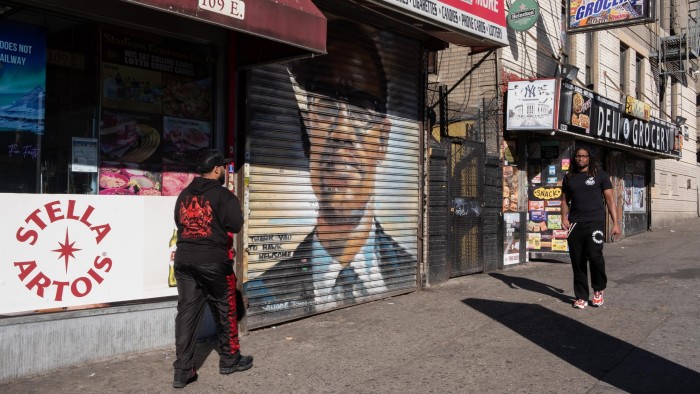Yahay Obeid, who arrived in the US from Yemen aged 8, trained as a pilot, and now controls air traffic at JFK airport, is more than just a model American immigrant.
At the height of the first administration of Donald Trump, he was held up in a speech by his Democratic representative, the Bronx’s Alexandria Ocasio-Cortez, as a victim of the “Muslim ban”, the government shutdown, and the “anti-immigration sentiment” flowing from the White House.
But on Tuesday, Obeid and probably thousands of fellow members of the Muslim community in the Bronx — which contains both the poorest and bluest Congressional districts in the US — voted for Trump, as did many of the area’s Hispanic and Latino inhabitants.
“What we have done right now is hold the Democrats accountable,” said Obeid of the borough’s 65,000 new Trump voters, who the Republican candidate targeted with a pledge to fight inflation and illegal immigration. “They have taken our vote for granted.”
In a swing that shook the Democratic establishment in New York City, Kamala Harris won just 73 per cent of the vote in the Bronx — 10 percentage points lower than Joe Biden achieved in 2020. Voting patterns across the borough, where more than 70 per cent of registered voters are Democrats, suggest the party shed support among communities that once formed its core base.
For many in the Bronx, which has the worst public health record in the state, the calculation was, “how much worse can it get?”, said former firefighter Mike Rendino, chair of the Bronx Republican party. “At some point they realised Democratic policies no longer worked.”
Rubén Díaz Sr, a former state senator and registered Democrat who introduced Trump at a rally in Crotona Park in May and spent the past few weeks driving around the Bronx in a truck campaigning for the Republicans, said the backlash against his own party was long coming.
“We Hispanics, we are not liberal, we are conservatives”, the ordained minister said. Even among a community of first and second generation immigrants, illegal migration “was one of the main issues”, he added.
Díaz said there was anger at measures such as the debit cards handed out by the city administration to migrant families to purchase food.
While the Bronx, which has been governed by Democrats for decades, suffers from high rates of homicide and violent crime, the Republican stronghold of Staten Island “has the better security, the better street cleaning, the better services”, Diaz added.
Even before Trump’s re-election bid, a slight shift towards the Republicans was in the offing. Last year, the Bronx voted in its first Republican on the city council in 40 years.
Although the Republican party itself did not spend money campaigning in the Bronx, Trump sought to capitalise on his growing support in the borough, visiting once for his rally, and once to film a Fox & Friends segment in a local barbershop, during which he told patrons: “You guys are the same as me.” He was the first Republican presidential candidate to campaign in the Bronx since Ronald Reagan, who went on to win New York.

Conversely, Harris and the Democrats forgot that people in the Bronx were “just like any other any regular American”, according to Sammy Ravelo, who came to America from the Dominican Republic in his teens and went on to serve in the US Army and as a New York police officer. “They know their pocketbook, how much they are paying for eggs.”
A local Democratic politician’s exhortation that Trump would imperil social security payments was taken as an insult by some, Ravelo added, for the implication that their community was reliant on government handouts. “The Dominican community is not a monolith,” he said.
Far from being put off by Trump’s pledge to implement mass deportations of illegal immigrants, a small but growing number of Dominicans welcomed the tough stance, Ravelo claimed. “You know who wants mass deportation most?” Ravelo, who was one of the first responders during the September 11 attacks, asked. “Legal migrants.”
A shopkeeper in the Morris Park neighbourhood of the Bronx, who asked not to be named, said she had agreed with Republicans on cultural issues such as their opposition to “Proposition 1”, a proposed amendment to New York’s constitution that conservatives claimed would allow transgender children to play on girls’ sports teams, which passed on Tuesday night.
Trump’s courting of the Bronx vote had its hiccups. At an October rally in Manhattan, a comedian sparked outrage by referring to Puerto Rico as a “floating pile of garbage”.
“Trump should have fired whoever allowed that person to go on,” said the Republican party’s Rendino, who thought that he lost significant support in the borough as a result.
But attempts by Democrats to talk up the threat posed by Trump to democracy itself increasingly fell on deaf ears, said Obeid, especially among his Yemeni community, whose elders strongly endorsed the Republican candidate just days before the election.
“We grew up in dictatorships, you can’t fool us by calling someone who is outspoken a dictator,” he said. Instead, with what he saw as a tacit endorsement of the “genocide” unfolding in Gaza, “we felt the world would end under Biden”.
In response to Trump’s win, the Bronx’s Democratic congressman Ritchie Torres blamed “the far left”, adding that the working class was “not buying [their] ivory-towered nonsense”.
That was not true for Obeid. On Tuesday, while voting for Trump, he also chose to re-elect Ocasio-Cortez, one of the few senior New York City politicians to call for a permanent ceasefire in Gaza.
Read the full article here




